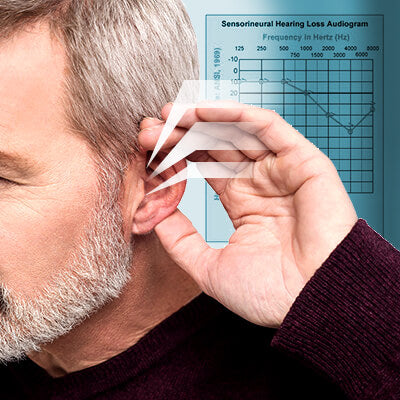
Why is High-Frequency Hearing Loss So Common?
Share
If you’ve been diagnosed with high-frequency hearing loss, or suspect that you are suffering from it, you may be wondering why hearing loss happened to you and why high-frequency hearing loss is so common.
However, before you can understand why high-frequency hearing loss happens so often, it is important to understand what it is and why it occurs in the first place.
What is a high-frequency hearing loss?
Your hearing loss is considered high-frequency hearing loss when you have trouble hearing sounds between 2000 Hertz and 8000 Hertz.
Sounds in that range include high-pitched noises, like birds singing, electronic alerts – such as an alarm – and the voices of women and children, among other things.
Oftentimes, people with high-frequency hearing loss report being able to hear but not being able to understand words and/or sentences during conversations.
This is because high-frequency hearing loss causes certain consonants to be more difficult to hear, making mix-ups easy. For example, the word ‘steaks’ and the word ‘states’ may sound the same to someone with high-frequency hearing loss.
That obviously makes conversing difficult. Unfortunately, due to that difficulty, hearing loss sufferers sometimes withdraw, limiting social interactions to avoid embarrassment and confusion.
Why does it occur?
One of the reasons high-frequency hearing loss is so common is that it has many origins. We’ve outlined a few causes of high-frequency hearing loss below:
-
Noise-induced.
According to the CDC, 26 million adults between the ages of 20 and 69 years old have suffered permanent damage to their hearing from excessive exposure to noise. Unfortunately, people often don’t protect their hearing properly in noisy situations and end up with hearing damage. Have you worked in a noisy environment? Attended loud concerts without hearing protection? Listened to electronic devices at max volume? If so, you may have suffered noise-induced hearing loss.
-
Medications & Diseases
Some medications are ototoxic, which means they have a toxic effect on the ear or the ear's nerve supply. It is possible for ototoxic medications to damage your ears permanently, leading to hearing loss. Certain diseases – diabetes and heart disease, for example – have also been known to damage hearing and can lead to permanent high-frequency hearing loss.
-
Age
One cause of hearing loss that none of us can escape is age. Age-related hearing loss, known as presbycusis, is one of the most common conditions among elderly adults. Age-related hearing loss comes on gradually and usually occurs in both ears.
For more information on hearing loss caused by aging, read our article: The Causes of Hearing Loss: Aging.
So why is it so common?
Now that you understand what leads to high-frequency hearing loss, it should be easier to understand why it’s so common. Noise-induced and age-related hearing loss can both be high-frequency hearing losses, and both occur at a high rate in our society.
With the rise in the use of electronics, like smartphones and personal listening devices, hearing loss is only becoming more prevalent.
What can be done?
A very important point to note is that once hearing loss has occurred, it cannot be corrected. In other words, there is no cure for hearing loss. However, you can make the difficulties that occur due to hearing loss easier by managing them, and by protecting your hearing from this point on.
Just because you already have hearing loss doesn’t mean that your hearing can't be further damaged. If you work in a noisy environment, attend loud events, like concerts, or otherwise expose your ears to damaging noise, wear hearing protection!
You can help to manage your hearing loss by getting a hearing aid. In many cases, hearing aids help high-frequency hearing loss sufferers hear more clearly again.
If you’re suffering from high-frequency hearing loss, you can use our Online hearing check or see an audiologist to ascertain how serious your hearing loss is, and you can then use that information to help you find a hearing aid that suits your needs.
There are a variety of hearing aids available that will suit a wide range of hearing loss, including convenient rechargeable models, like the HearClear HCR3 and the HearClear HCRD.
If you need assistance in choosing an advanced affordable hearing aid that will work for your situation, please just give our hearing professionals a call at 800-804-0434.
We will be happy to help you hear clearly again at an affordable price!
